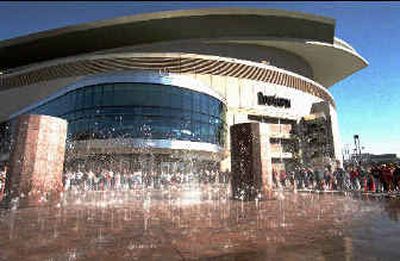Wilted Rose loses its fragrance

When Qyntel Woods fights pit bulls in a room over his garage and Darius Miles verbally accosts and demeans Portland’s coach in front of the team, it’s legitimate to ask why I choose to focus on the club’s arena woes.
It’s because I’m fascinated that a billionaire will dump his arena the way he did Woods, who was cut within hours after he pled guilty to a charge of misdemeanor animal abuse.
Paul Allen promised the people of Portland a Rose Garden. But the owner of the Trail Blazers never promised to assume overwhelming debt coupled with bondholder and public indifference.
For those of you who wonder why the owners of sports teams seek public subsidies, for those of you who still don’t think Dallas Cowboys owner Jerry Jones needed all that money from Arlington, Texas, to build a stadium that will line his pockets, here’s why:
The Rose Garden was built with private funds. It sits in the 24th media market, and the Blazers are its only major league tenant. The building has lost money in seven of its nine years, needs $11-12 million in deferred maintenance and another $20 million in upgrades. An architectural firm commissioned by the club projected a need to put $140 million in capital into the building over the next 20 years and estimated Allen’s losses in the range of $300 to $500 million in that period.
I’m not naive here. I know numbers can be crunched to support the argument for either side. I know there isn’t an owner around who expects to hold onto a facility for 20 years before wanting a new one.
Blazers president Steve Patterson has an unusual perspective on all this. He worked for the Texans and helped put together the deal that brought the NFL back to Houston. He formulated a bid to bring an NHL team to that city. He’s acquainted with the arena/stadium lease agreements in those three leagues and estimates that he’s studied half of the arrangements in major league baseball.
His assessment of Portland’s arrangement?
“It is the worst by far,” Patterson said.
The trouble here is that in a time when cities are clamoring for owners to assume a greater fiscal burden, Allen assumes that burden, props up the venture and receives no relief. The bondholders, primarily the big insurance companies in the area, refuse to restructure the debt and the city – which invested nothing – makes more than $4 million a year off the deal when parking revenues and the 6 percent sales tax it receives off every ticket are factored.
That’s why the Blazers turned the Rose Garden over to its bondholders one minute before midnight on Dec. 31. Allen lost his arena apartment in the process. He got it back in a settlement since the bondholders didn’t own the cash registers, food service equipment, security system or box office necessary to stage any event. All of that belonged to Allen.
Patterson said the club is $16.5 million better off this year because it no longer owns and manages the arena. I don’t care how much Allen is worth. That’s not a loss he’s willing to absorb with no end in sight.
That’s not a cash cow.
It’s a cash alligator.
“At the end of the day, you’ve got to say, ‘Look, guys, this is like the Chevy that’s up on blocks in the front yard and it’s worth 500 bucks,’ ” Patterson said. “You owe $5,000 bucks on it. You either work something out here or the key is in the ignition, the gate’s unlocked, the dog’s in the house and the porch light is on. Come and get it.
“That’s basically what we had to say.”
Scoring jump doesn’t qualify as trend
NBA scoring and field-goal percentage is up from last season. Eight teams are averaging at least 100 points compared to two teams last season.
But we advise against believing an offensive renaissance is under way. The average of 96.3 points per team is still 5.1 points lower than it was 10 years ago. The field-goal percentage of .444 is the fifth-lowest in the last 36 years.
What we have now is an offensive uptick. It’s too early to call it a trend.
Detroit hasn’t fired on all pistons
We all knew Detroit would face obstacles in defending its title. But 10 of the team’s 18 losses have been to teams playing less than .500, and seven of those were at home.
The Pistons are just 4-6 in the division. These are red flags that the Pistons believe they can turn it on when needed.
“I don’t get the feeling we’re playing harder than everybody,” coach Larry Brown said. “That’s the thing that troubles me.”